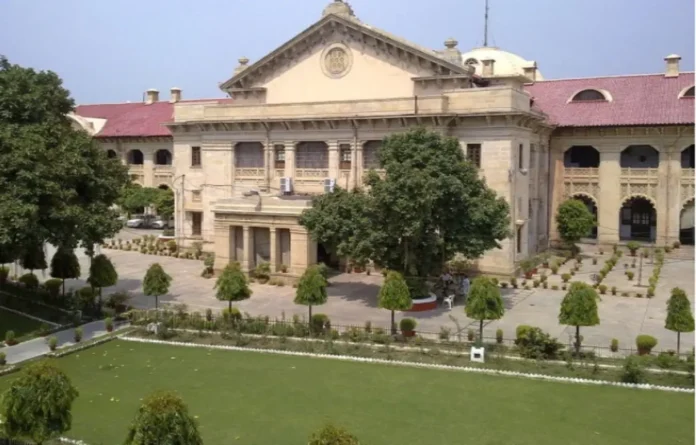The Allahabad High Court has rejected the bail application of a man accused of murdering a minor child.
A single-judge bench of Justice Ajay Bhanot passed this order while hearing a Criminal Misc Bail Application filed by Manu Kumar Rajbhar.
By means of the bail application, the applicant has prayed to be enlarged on bail in Case at Police Station Reoti, District Ballia, under Sections 302, 201, 363 IPC. The applicant has been in jail since 23.06.2024. The bail application of the applicant was rejected by the trial court on 18.07.2024.
The applicant has been identified as the principal offender who murdered the minor child. The applicant was last seen with the deceased at a time proximate to the death of the latter. In fact, the applicant had enticed away the deceased along with the co-accused. Incriminating articles including clothes of the deceased had been recovered at the pointing out of the applicant. The offence is grave. There is a likelihood that the applicant had committed the offence. At this stage, no case for bail is made out.
Without going into the merits of the case, the Court dismissed the bail application.
Shashi Ranjan Srivastava, counsel for the applicant, contends that the trial is moving at a snail’s pace and shows no sign of early conclusion. The prosecution is deliberately delaying the conduct of the trial to prolong the incarceration of the applicant. Various other aspects delaying the trial have also been highlighted including the failure of the trial court to faithfully implement the mandate of Section 309 CrPC. Other bottlenecks which cause delay in trials in the State of UP like failure of the police to promptly serve the summons and execute coercive measures issued by the trial court to compel the appearance of the witnesses have also been brought to the notice of the Court.
Considering the gravity of the offence, interest of justice will be served by directing the trial court to expedite the trial, the Court observed.
The Court said,
Though no specific time frame to conclude the trial has been set out in the CrPC, yet the legislative intent of Section 309 CrPC is explicit. The scheme of the provision clearly shows that the legislative intent is to conclude the trial in an expeditious time frame. In the facts of this case, the trial court shall make all endeavours to conclude the trial expeditiously. Preferably the trial court shall set for itself a reasonable time frame to conclude the trial, say one year from the date of receipt of a certified copy of the order.
The trial court has also to be conscious of the rights of the accused persons and is under obligation of law to ensure that all expeditious, necessary and coercive measures as per law are adopted to ensure the presence of witnesses. Counsels or parties who delay or impede the proceedings should not only be discouraged from doing so but in appropriate cases exemplary costs should also be imposed on such parties/ counsel.
The Court directed all witnesses and counsels to cooperate with the trial proceedings. The trial court shall issue summons by regular process as per Section 62 CrPC and also by registered post as provided under Section 69 CrPC to expedite the trial.
The Court further said that the trial court shall promptly take out all strict coercive measures against all the witnesses in accordance with law who fail to appear in the trial proceeding. Counsels or parties who delay or impede the proceedings should not only be discouraged from doing so but in appropriate cases exemplary costs should also be imposed on such parties/ counsel.
The Court further directed counsels as well as the trial court to comply with the directions issued by the Court in Noor Alam Vs State of UP reported at 2024 (5) ADJ 766. In case, any strike happens during the course of the trial, the learned trial court is directed to ensure full compliance of the directions issued in Noor Alam (supra) to prevent delay in the trial.
The police authorities shall ensure that warrants or any coercive measures as per law taken out by the trial court to ensure that the attendance of the witnesses are promptly executed.
The Superintendent of Police, Ballia shall file an affidavit before the trial court on the date fixed regarding the status of execution of the warrants/service of summons taken out by the trial court.
The delay in the trials caused by the failure of the police authorities to serve summons or execute coercive measures to compel the appearance of witnesses at the trial despite a statutory mandate, is an issue of grave concern.
“In case the police authorities are failing to comply with the directions issued by the Court in Bhanwar Singh @ Karamvir (supra) & Jitendra (supra) and do not implement the said directions of the Director General of Police, Government of UP & the Home Secretary, Government of UP in regard to service of summons and execution of coercive measures to compel the appearance of witnesses, the trial court shall direct the concerned Senior Superintendent of Police to file an affidavit in this regard.
The trial court shall be under an obligation to examine whether the judgements of the Court in Bhanwar Singh @ Karamvir (supra) & Jitendra (supra) as well as directions of Director General of Police, Government of UP & the Home Secretary, Government of UP issued in compliance thereof have been implemented or not and to take appropriate action as per law,” the order reads.


